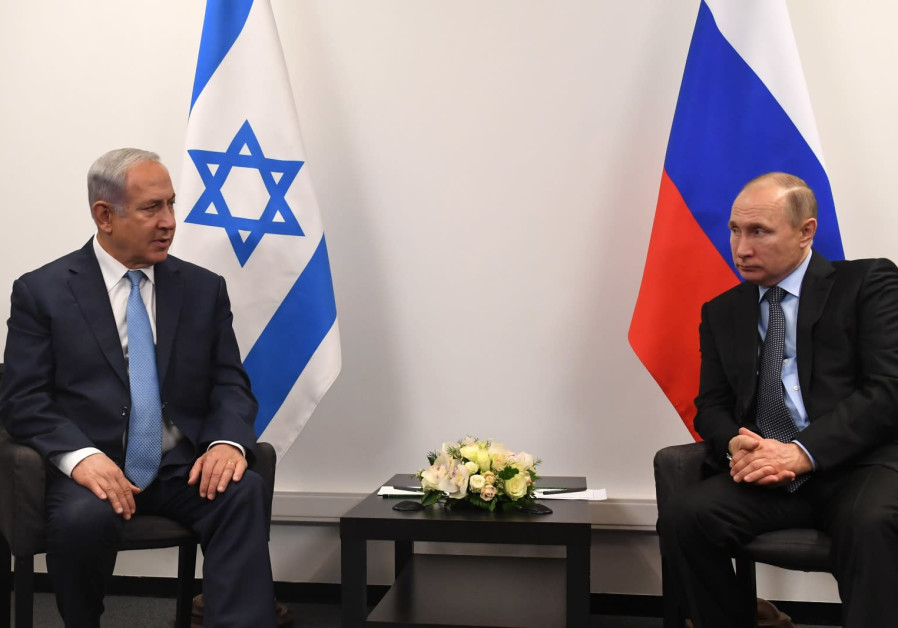Netanyahu to Putin: Don’t supply Syria with S-300 anti-missile system

Prime Minister Benjamin Netanyahu and Russian President Vladimir Putin meet in Moscow on January 29, 2018.. (photo credit: KOBI GIDEON/GPO)
Russia’s plan to supply its advanced S-300 anti-missile system to Syria within two weeks will endanger the region, Prime Minister Benjamin Netanyahu told Russian President Vladimir Putin, in a telephone call on Monday night.
“The transfer of advanced weapons systems into irresponsible hands will increase the dangers in the region,” Netanyahu told the Russian leader. “Israel will continue to defend its security and its interests.”
The two men spoke after Defense Minister Sergei Shoigu announced that Russia intended to give the Syrians, who have already been trained on the S-300s, within the next two weeks, in response to the downing of an Ilyushin military plane over the war-torn country last week.
The delivery of the advanced missile defense system to Syria is “an adequate response” to Israel’s role in the downing of the Russian plane last week, Shoigu was quoted as saying by Russian media during a briefing.
The system will be deployed to boost the security of Russian troops in Syria, and will ensure the identification of Russian aircraft by Syrian air defense forces.
“The command posts of Syrian air defense forces and units will be equipped with automated control systems only supplied to the Russian armed forces,” TASS News Agency quoted Shoigu as saying. “This will facilitate centralized control over all forces and resources of the Syrian air defense, monitor the situation in the air and ensure operative issuance of orders. Most importantly, we will guarantee the identification of all Russian aircrafts by the Syrian air defense systems.”
According to the Russian Defense Ministry, Moscow will also impose electronic countermeasures over Syria’s coastline which would “suppress satellite navigation, onboard radar systems and communications of warplanes attacking targets on Syrian territory, in the regions over the waters of the Mediterranean Sea.”
The advanced S-300 would be a major upgrade to Syrian air defenses, and would pose a threat to Israeli jets on missions against Iranian targets in Syria. The long-range missile defense system can track objects such as aircraft and ballistic missiles over a range of 300 kilometers.
Alexander Khramchikhin of the Moscow-based Institute of Military and Political Analysis said the S-300 could “seriously affect Israel’s ability to carry out its strikes in Syria.” Dmitri Trenin, director of the Carnegie Moscow Center and a former colonel in the Russian army, said the S-300 would make Israel “more careful in the vicinity of Russian assets.”
Russia said it believes that Israel was responsible for the downing of its military plane and the loss of 15 Russian military personnel who were on board.
Netanyahu told Putin that he had full confidence in the results of the IDF investigation and its conclusions.
The Syrian military, which brought down the plane, and Iran, whose aggression is undermining stability, are responsible for the unfortunate incident, the premier added.
According to the Kremlin, Putin “emphasized that Russia’s decisions to bolster the combat capabilities of Syrian air defenses are appropriate at this juncture and primarily intended to thwart any potential threat to the lives of the Russian military service members fulfilling the tasks of combatting international terrorism.”
The two men agreed to continue the dialogue between their professional teams, as well as the inter-military coordination via military channels, the Prime Minister’s Office said. It added that “Netanyahu again expressed his condolences over the death of Russian soldiers.”
US Secretary of State Mike Pompeo said on Monday he expected to meet with his Russian counterpart Sergei Lavrov in New York, as Washington expressed concern at Moscow’s plans with regard to the S-300.
“I’m sure Sergei and I will have our time together,” Pompeo said of plans to meet Lavrov on the sidelines of the United Nations annual gathering of world leaders.
“We are trying to find every place we can where there is common ground, where we can work with the Russians,” Pompeo said, adding that there were many areas where Moscow was working against the United States, and “we will hold them accountable.”
The White House said it hoped Moscow would reconsider the move, which US National Security Advisor John Bolton called a “significant escalation” of the seven-year war.
Syrian air defenses are largely antiquated Soviet-era systems, with SA-2s, SA-5s and SA-6s, as well as the more sophisticated tactical surface-to-air missiles, such as the SA-17s and SA-22 systems. Russia has also supplied the short-range Pantsir S-1 to the Assad regime.
Moscow had refused to supply the surface-to-air missile system to Syria a few years ago, after taking into account the pressing request of some Western countries.
Shoigu stated on Monday that the situation surrounding its deployment has since “changed through no fault of Russia,” and stressed that if measures taken by Russia after the downing of the reconnaissance plane “failed to cool hotheads, we will have to respond in line with the situation.”
Reuters contributed to this report
Join Jerusalem Post Premium Plus now for just $5 and upgrade your experience with an ads-free website and exclusive content. Click here>>






Comments are closed.